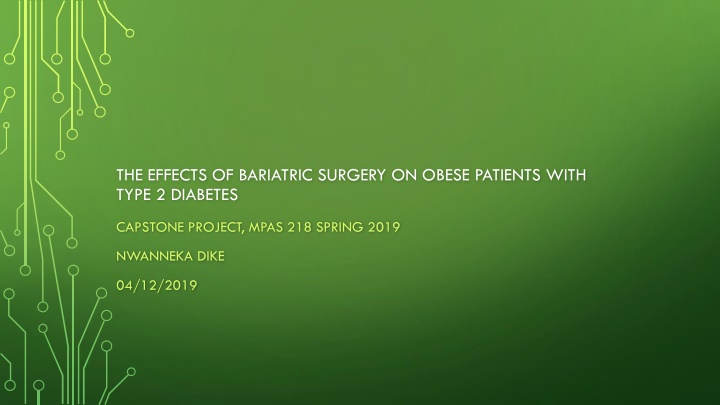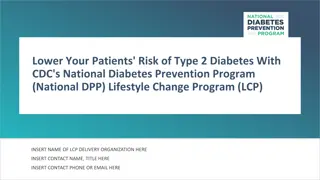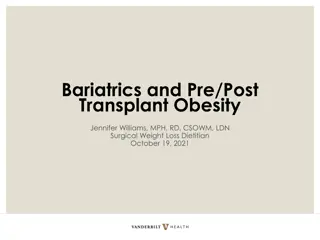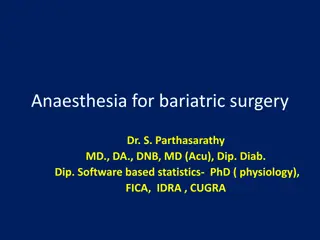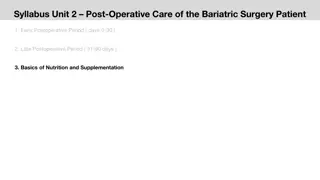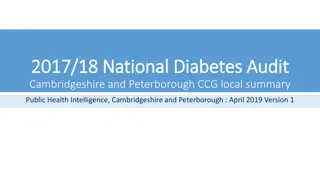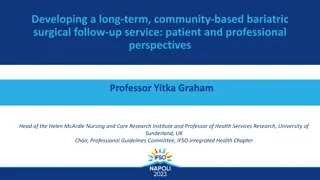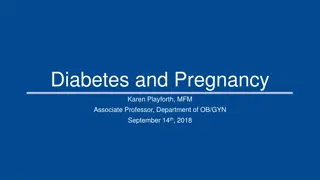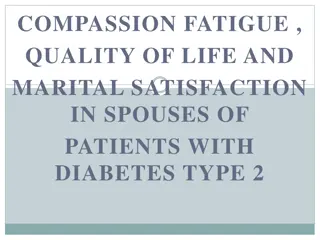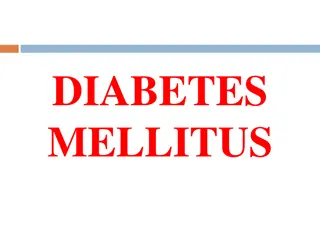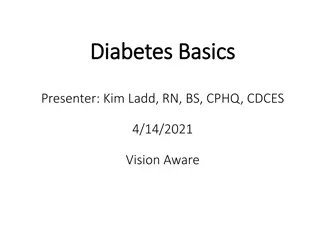Effects of Bariatric Surgery on Obese Patients with Type 2 Diabetes - Capstone Project
Examining the impact of bariatric surgery versus standard medical therapy on health outcomes in obese individuals with Type 2 Diabetes. Explore prevalence, interventions, surgical options, and evidence from studies.
Download Presentation

Please find below an Image/Link to download the presentation.
The content on the website is provided AS IS for your information and personal use only. It may not be sold, licensed, or shared on other websites without obtaining consent from the author.If you encounter any issues during the download, it is possible that the publisher has removed the file from their server.
You are allowed to download the files provided on this website for personal or commercial use, subject to the condition that they are used lawfully. All files are the property of their respective owners.
The content on the website is provided AS IS for your information and personal use only. It may not be sold, licensed, or shared on other websites without obtaining consent from the author.
E N D
Presentation Transcript
THE EFFECTS OF BARIATRIC SURGERY ON OBESE PATIENTS WITH TYPE 2 DIABETES CAPSTONE PROJECT, MPAS 218 SPRING 2019 NWANNEKA DIKE 04/12/2019
DISCLAIMER The information provided in this presentation are for educational purposes only and does not constitute specific medical advice. There are no conflict of interest to disclose.
PICOT QUESTION In obese patients with Type 2 diabetes, what is the effect of bariatric surgery compared to standard medical therapy alone in improving health- related outcomes at least 1-year post-op?
LEARNING OBJECTIVES Describe the prevalence of obesity and T2DM including health impacts Discuss standard medical therapies and their efficacy Discuss surgical interventions including current research findings Provide evidence on long term benefits including impact on clinical practice
BACKGROUND INFORMATION Statistics The percentage of obese US adults with T2DM is estimated between 25-30% The worldwide prevalence of obesity is projected to rise to approx. 58% by 2030 while T2DM is expected to rise to about 10% by same time period. General Overview T2D is diagnosed with Hgb A1c 6.5% or FPG 126 mg/dL Obesity is defined by BMI 30kg/m2 Health Impacts Cardiovascular risk factors Micro and macrovascular complications Poor quality of life
BACKGROUND INFORMATION Current interventions with minimal efficacy Lifestyle modification Biguanides and glitazones Sulfonylureas and incretin mimetics Insulin and non-insulin injectables Need to attain durable glycemic control and halt disease progression Early intervention through metabolic surgery Reduce cause-specific mortality
FINDING ANSWERS Indications for surgery Surgical options Sleeve gastrectomy Roux-en-Y gastric bypass Gastric band
EXAMINING THE EVIDENCE Wide range of studies and medical literature are available on this question Most were randomized controlled trials Some were observational follow ups, others retrospective matched cohort or controlled intervention studies Similar findings in majority of these studies
EXAMINING THE EVIDENCE SLIMM-T2D Trial by Halperin et al Findings: 58% in surgery group compared to 16% in IMWM program showed improvement in A1c < 7% one year post-op. Also improvement in FPG, waist circumference, triglycerides and HDL levels Strength: RCT Weakness: Small population size, not generalizable STAMPEDE Trial by Schauer et al Findings: In the surgery group particularly the RYGB group, total body weight loss, increased beta cell function and improvement in insulin sensitivity occurred at 2 years post-op Strengths: RCT, 2-year extension of a metabolic sub study Weakness: small sample size, validity of incretin hormone responses
EXAMINING THE EVIDENCE SOS Study by Romeo et al Findings: reduced incidence of fatal and nonfatal cardiovascular events occurred after surgery compared to the control group Strengths: Large sample size, longer follow up period, first prospective report Weakness: non randomized controlled trial Observational Study by Fisher et al Findings: significantly lower risk of major macrovascular events at 5 years follow up after bariatric procedures compared to matched control group Strengths: large sample size, long follow up period Weakness: insufficient sample to compare alternative bariatric procedures, observational study
EXAMINING THE EVIDENCE Diabetes Surgery Study by Ikramuddin et al Findings: 23% vs 4% significantly better composite triple endpoint was achieved in surgery group at 5 years post-op. Strengths: generalizability, all inclusive primary endpoint Weaknesses: higher baseline A1c and longer duration of disease
SUMMARY OF EVIDENCE Bariatric surgery does improve diabetes primary end goal Most patients showed greater weight loss and improved A1c levels with good evidence quality Patients who underwent RYGB seemed to show the most improvement More RCTs are required to assess the effectiveness of other bariatric surgery procedures Continued clinical trials to support existing evidence
GENERAL CONCLUSIONS Evidence showing bariatric surgery provides good control of obesity and diabetes is increasing Improved insulin sensitivity and pancreatic beta cell function Weight loss and improved A1c levels Improved physical fitness and life expectancy Reduced incidence of cardiovascular events Less medication use and increased disease remission
IMPLICATION FOR PRACTICE Consider early in the course of treatment Understand the mechanism by which these procedures improve diabetes control Understand short and long-term surgical complications Engage patients in shared decision making Continue to encourage lifestyle modification and medication compliance
KNOWLEDGE GAPS How sustainable are the benefits of surgery over time? Intervention time for durable T2DM remission At what point is surgery not an option? Cost effectiveness data More studies on the role of multimodal therapy
FUTURE RESEARCH Larger randomized clinical trials to support current evidence Healthy diet and active lifestyle beginning in early childhood to help curb the growing incidence of obesity and T2DM More reliable clinical and biological markers to help identify an accurate definition of diabetes remission and cure
REFERENCES 1. Halperin F, Ding SA, Simonson DC, et al. Roux-en-Y gastric bypass surgery or lifestyle with intensive medical management in patients with type 2 diabetes: Feasibility and 1-year results of a randomized clinical trial. JAMA Surg. 2014. 149(7): 716-26. 2. Kashyap SR, Bhatt DL, Wolski K, et al. Metabolic effects of bariatric surgery in patients with moderate obesity and type 2 diabetes: Analysis of a randomized controlled trial comparing surgery with intensive medical treatment. Diabetes care. 2013; 36(8):2175-2182. 3. Romeo S, Maglio C, Burza MA, et al. Cardiovascular events after bariatric surgery in obese subjects with type 2 diabetes. Diabetes Care. 2012; 35(12): 2613-17. 4. Schauer DP, Arterburn DE, Livingston EH, et al. Impact of bariatric surgery on life expectancy in severely obese patients with diabetes: A decision analysis. Ann Surg. 2015; 261(5): 914-919. 5. Ikramuddin S, Korner Lee WJ, et al. Lifestyle Intervention and medical management with vs without Roux-en-Y gastric bypass and control of hemoglobin A1c, LDL cholesterol and systolic blood pressure at 5 Years in the diabetes surgery study. JAMA. 2018; 319(3): 266-278. 6. Kashyap SR, Gatmaitan P, Brethauer S, and Schauer P. Bariatric Surgery for type 2 diabetes: Weighing the impact for obese patients. Cleve Clin J Med. 2010; 77(7): 468-476. 7. Pariosan J, Ding SA, Wewalka M, et al. Physical activity in obese type 2 diabetes after gastric bypass or medical management. Am J Med. 2017; 130(1): 83-92. 8. Fisher DP, Johnson E, Haneuse S, et al. Association between bariatric surgery and macrovascular disease outcomes in patients with type 2 diabetes and severe obesity. JAMA. 2018; 320(15): 1570-82.
